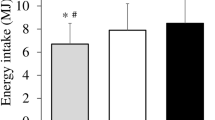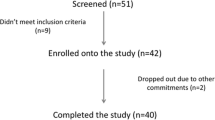Abstract
Purpose
Consuming 375–500 ml of water 30 min before a meal has been shown to reduce energy intake in older, but not younger adults. This study investigated the effects of ingesting a water preload immediately pre-meal (<1 min before eating) on within-meal ad libitum energy intake in non-obese young males.
Methods
Fourteen healthy males [mean (SD) age 27 (3) years, height 1.83 (0.05) m, body weight 80.47 (9.89) kg, body fat 17.5 (4.0) %, body mass index 24.0 (2.5) kg/m2] completed a familiarisation trial and two experimental trials in randomised counterbalanced order. Subjects arrived at the laboratory overnight fasted and consumed an ad libitum porridge breakfast. Immediately prior to the meal, subjects consumed either a 568 ml (1 pint) water preload (preload trial) or no preload (control trial). Visual analogue scale questionnaires to assess hunger, fullness and satisfaction were completed before and after the meal in both trials, as well as after the water preload.
Results
Ad libitum energy intake was greater (P < 0.001) during control [2551 (562) kJ] than preload [1967 (454) kJ]. Ad libitum water intake was also greater (P < 0.001) during control [318 (226–975) ml] than preload [116 (0–581) ml]. The water preload increased fullness and satisfaction and decreased hunger compared to pre-trial (P < 0.001) and the control trial (P < 0.001).
Conclusion
This study demonstrates that consumption of a 568 ml water preload immediately before a meal reduces energy intake in non-obese young males. This might therefore be an effective strategy to suppress energy intake in this population and possibly assist with weight management.

Similar content being viewed by others
References
Health and Social Care Information Centre (2014) Statistics on obesity, physical activity and diet. England. http://www.hscic.gov.uk
Anderson GH, Moore SE (2004) Dietary proteins in the regulation of food intake and body weight in humans. J Nutr 134:974S–979S
Bowen J, Noakes M, Trenerry C, Clifton PM (2006) Energy intake, ghrelin, and cholecystokinin after different carbohydrate and protein preloads in overweight men. J Clin Endocrinol Metab 91:1477–1483
Bertenshaw EJ, Lluch A, Yeomans MR (2008) Satiating effects of protein but not carbohydrate consumed in a between-meal beverage context. Physiol Behav 93:427–436
Dennis EA, Dengo AL, Comber DL, Flack KD, Savla J, Davy KP, Davy BM (2010) Water consumption increases weight loss during a hypocaloric diet intervention in middle-aged and older adults. Obesity 18:300–307
Muckelbauer R, Sarganas G, Grüneis A, Muller-Nordhorn J (2013) Association between water consumption and body weight outcomes: a systematic review. Am J Clin Nutr 98:282–299
Rolls BJ, Kim S, Fedoroff IC (1990) Effects of drinks sweetened with sucrose or aspartame on hunger, thirst and food intake in men. Physiol Behav 48:19–26
Van Walleghen EL, Orr JS, Gentile CL, Davy BM (2007) Pre-meal water consumption reduces meal energy intake in older but not younger subjects. Obesity 15:93–99
Davy BM, Dennis EA, Dengo AL, Wilson KL, Davy KP (2008) Water consumption reduces energy intake at a breakfast meal in obese older adults. J Am Diet Assoc 108:1236–1239
Share I, Martyniuk E, Grossman MI (1952) Effect of prolonged intragastric feeding on oral food intake in dogs. Am J Physiol 169:229–235
Paintal A (1954) A study of gastric stretch receptors. Their role in the peripheral mechanism of satiation of hunger and thirst. J Physiol 126:255–270
Clarkston WK, Pantano MM, Morley JE, Horowitz M, Littlefield JM, Burton FR (1997) Evidence for the anorexia of aging: Gastrointestinal transit and hunger in healthy elderly vs. young adults. Am J Physiol 272:R243–R248
Stunkard AJ, Messick S (1985) The three-factor eating questionnaire to measure dietary restraint, disinhibition and hunger. J Psychosom Res 29:71–83
Faul F, Erdfield E, Buchner A, Lang AG (2009) Statistical power analyses using G*Power 3.1: tests for correlation and regression analyses. Behav Res Methods 41:1149–1160
Durnin J, Womersley J (1974) Body fat assessed from total body density and its estimation from skinfold thickness: measurements on 481 men and women aged from 16 to 72 years. Br J Nutr 32:77–97
Flint A, Raben A, Blundell JE, Astrup A (2000) Reproducibility, power and validity of visual analogue scales in assessment of appetite sensations in single test meal studies. Int J Obes Relat Metab Disord 24:38–48
Calbet JA, MacLean DA (1997) Role of caloric content on gastric emptying in humans. J Physiol 498:553–559
Vist GE, Maughan RJ (1994) Gastric emptying of ingested solutions in man: effect of beverage glucose concentration. Med Sci Sports Exerc 26:1269–1273
Rolls BJ, McDermott TM (1991) Effects of age on sensory-specific satiety. Am J Clin Nutr 54:988–996
Popkin BM, Barclay DV, Nielsen SJ (2005) Water and food consumption patterns of US adults from 1999 to 2001. Obes Res 13:2146–2152
Stookey JD, Constant F, Gardner CD, Popkin BM (2007) Replacing sweetened caloric beverages with drinking water is associated with lower energy intake. Obesity 15:3013–3022
Conflict of interest
The authors declare they have no conflict of interest.
Author information
Authors and Affiliations
Corresponding author
Rights and permissions
About this article
Cite this article
Corney, R.A., Sunderland, C. & James, L.J. Immediate pre-meal water ingestion decreases voluntary food intake in lean young males. Eur J Nutr 55, 815–819 (2016). https://doi.org/10.1007/s00394-015-0903-4
Received:
Accepted:
Published:
Issue Date:
DOI: https://doi.org/10.1007/s00394-015-0903-4




